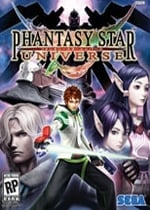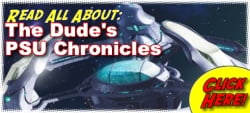We hate to love a game that’s so flawed yet so insanely addictive. Read our preliminary review for details.
I’m going to go on record with you fine folks reading this review by saying I didn’t want to write this review. No, it isn’t because I’m lazy (although that’s not to say that isn’t true either) or that I don’t like this game, but it’s because Phantasy Star Universe is far from being a complete game. There are missions that haven’t been added, cross-class elements that haven’t been implemented, and an entire planet that hasn’t been opened to gamers online. Sega has decided to charge players 50 or 60 dollars to play an incomplete game. Having said that, we still couldn’t put this game away during our review time. The only reason that I’m writing this review in fact is because after 70 hours of gameplay, you simply have to write something or your editor starts threatening you with the closest blunt object.
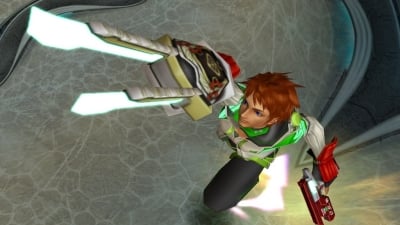
To accurately describe PSU to the un-initiated; the best word for it would be “hack-n-slash.” The controls for your character are exactly like Phantasy Star Online with some minor additions. For the most part, through, you’ll be hammering away at the attack button six-thousand times a mission, with a special move or weapon change thrown in every now and again. Unlike PSO, PSU has given players an actual storyline to follow in the single-player campaign mode instead of only providing the online game without friends or anyone else.
The story tells the tale of new Guardian hopeful Ethan Waber as he learns life’s lessons and fights the forces of evil to save the beloved Gurhal system from certain doom. The interesting part of the storyline that I have never seen done before is the game’s partitioning into twelve different chapters, each with its on intro and closing scene. Every time you complete a chapter, the game introduces you to some of the characters of the next chapter. It’s very “Robotech era” anime-ish and will either annoy you or draw you into the next chapter, bit it’s an interesting spin nonetheless.
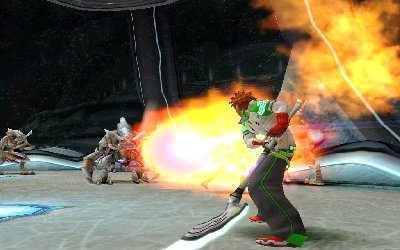
What isn’t interesting is the actual campaign itself. If an award were to go to the largest amount of redundant, fluffy content, we would certainly consider Phantasy Star Universe’s offline single-player Campaign mode as a top nominee. For the most part, the levels and monsters are the same as seen in the online mode with little-no-change. Sure, some enemies have an extra attack or have a different texture, but they are essentially the same. The repetitive combat in the single-player mode will turn many off, especially those who are used to complex combat systems like the recently-released FFXII. The only depth comes in the form of Photon Arts (attacks that attach to your weapons and do more damage than the normal strike), where you can level up your attacks to perform stronger combos. Unfortunately, these combos are awarded so quickly that the rewards will also begin to bore after a while.
Another major strike is the antiquated presentation throughout much of the single-player. PSU’s in-game engine, which runs most of the story outside of the openings and closings, is dull and stiff. The same three character actions are repeated throughout and the text-only dialog screams “Skip me. I’m useless!” The saving grace to the whole single-player mode is the cut scenes that you do get to see between the chapters, which at points border on fantastic.
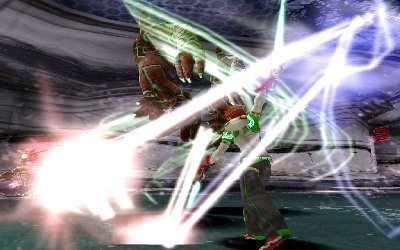
For the most part, however, the single-player is largely avoidable due to these and other problems, like terrible ally AI, graphical hiccups across all platforms, and the loss of human interaction. Online gameplay is, and always has been, the main draw for players of the Phantasy Star series, and the same is true here. Players can choose to be a male or female human, beast, CAST (Robot), or Newman. Each race has their own strengths and weaknesses, though it’s tough to tell at this point exactly what all of those are. The obvious differences are in strength, hit points, force (magic) strength, and attack accuracy. Beasts make terrific Hunters, the PSU melee combatants, because of their excellent health stats. CASTS can also be great Hunters because of their high accuracy and attack power, but their strongest class is Ranger, or gunner/ranged fighter. Newmans are most inclined to become Forces, or magicians, with their strong force stats and their low health, while Humans can pretty much do anything with average ability in everything.
With the choices above, there are still plenty of unknowns out there as far as certain races are concerned. For instance, the CASTs and Beasts unlock the ability to equip powerful transformations at level 20. Beasts can nano-transform into huge hulking versions of themselves, while CASTs can summon powerful weapons that dwarf them in size for huge damage. While there is rumor going around through the game as to what may be awarded to Humans and Newmans similar to this, there is nothing concrete to go on. There simply isn’t enough information available. Cross-classing, or combining the skills of two jobs into one, is another rumor flying around the game without any concrete proof. Apparently, after you reach certain levels in your respective class, you can choose to specialize further or pursue another route and choose a combination class. This feature is nowhere to be seen so far, however.
The missing features don’t end there, however. One of the three planets in the Gurhal system, Moatoob, is completely locked away from online gamers. There is literally a quarter of the game universe shut away at this article’s publication. Just like in PSO, players will spend a majority of their time completing missions with simple objectives like “Kill everything,” but even some of those are missing. There are mission lobbies that are dead ends at this point. All of this locked content is especially frustrating when you consider the game is being sold for full-price while gamers are stuck with the same two-dozen missions. It just doesn’t seem fair to us since the game also charges ten bucks a month to play as well.
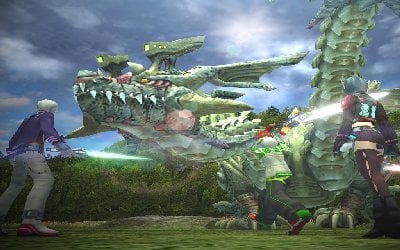
What draws us to this title like a moth to the flame, despite all of the flaws and screams of highway robbery, is the sheer drive towards materialistic goals you can strive for in-game. There’s always a sword or gun that’s a little bit better than the one you have now, and the carrot that drives gameplay is always nudged just a little bit further with every passing day. After 70 hours of game time, my level 30 CAST Hunter had an excellent arsenal and armor set, but the drive was now to stock my newly established store and sell my access goods. The drive for meseta, PSU’s monetary unit, is so strong that it literally makes the grinding bearable and very worthwhile.
Like many online games, the enjoyment achieved in-game is largely dependant on those you play with. We were fortunate to find many friendly and talkative players during our review time. Xbox 360’s’ voice chat support makes PSU a much more enjoyable experience by allowing players to communicate and interact with other players online. There’s only one version of the game to consider if you own a 360 in fact. Chatting with players about your favorite movies or music acts while slaying monsters for money and items will put you in a time warp and devour your social life.
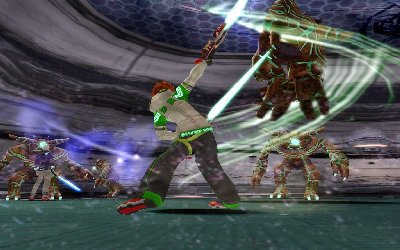
I still love the heck out of this game despite its laundry list of flaws and inconsistencies and would still recommend it to both fans of action RPGs and previous Phantasy Star titles. The menu system is archaic, there’s no efficient way to establish clans or gaming groups, there’s absolutely no PvP to speak of, and an entire planet is still locked away, but the available online content kept us tied up for days. Just make sure that you have a broadband connection before you buy it because the offline story mode is an afterthought that can’t compare to the online game. We will keep an eye on the game as it develops and do a full and proper review in a couple weeks. For now, check out our feature starring The Dude and his adventure from lowly newb CAST to the head of the first official PSU clan, Spirits of the Rising Sun.
Features:
Preview
Phantasy Star ditches the goofy card-based game in favor of the original action-RPG format. by Lincoln Stanley
RPG fans have got to love the PS2. It is home to some of the most beloved RPGs in existence. From Final Fantasy to Grandia, there certainly hasn’t been a lack of the genre on Sony’s behemoth. Players looking for more, however, will soon have a stick for which to satisfy that itch: Phantasy Star Universe is coming to the PS2 (note: also to the Xbox 360 and PC). Originally announced in 2004, this iteration of Sega’s beloved series looks to take what has been accomplished in the past and to build upon it while sticking true to the series’ roots.

While many players associate these games with multiplayer, Phantasy Star first got its start on the Genesis as single-player games. While not connected in any way with past Phantasy Star games, PSU will still have a heavy single-player element while also featuring multiplayer as well.
In the single-player campaign, you’ll play as Ethan, a (human) rebel without a cause. When one day his sister is threatened by malevolent aliens known as the Seed, he joins up the police force in PSU known as the Guardians. From a central hub in outer space, you’ll be able to access multiple planets as you seek to eradicate this extraterrestrial menace.

As Ethan, you’ll have access to over 200 weapons and items as you seek out and engage enemies. The fighting system is still real-time, but you’ll be able to switch weapons on the fly, from a slow, powerful sword to a duel pistol/saber combo that’s extremely speedy. That’s right, duel wielding. And not only will you be able to put a weapon in each paw, you also be able to switch into first-person mode for more accurate aiming. PSU is certainly trying to put the “action” into “action RPG.”
The paths you are able to take in PSU are linear only. You’ll follow pre-determined paths to your destination. No fancy free-roaming here, it’s strictly old school. The various planets you will explore are completely unique, however. Each will feature different landscapes and creatures that are adapted to the local environments.

Along your journey, you’ll be able to enter towns and cities on the various planets you find yourself visiting. You’ll be able to shop for new weapons and items, as well as chat up the locals, many of whom will have voices instead of only text like previous titles in the series.
All in all, the single-player campaign is looking to take about 35-40 hours to complete which, along with the other half of the game, makes it look like it is going to a pretty smart investment.
Multiplayer makes a triumph return in PSU. It takes off along the same timeline as the single-player game, but you will have to start a new character once you plan on planet hopping with your buddies. Exploration still works pretty much the same: You’ll start off in a central hub and pick up to five friends, two more than before, to adventure with. You’ll take quests and soon find yourselves adventuring across exotic alien landscapes, battling minions and the occasional screen-filling boss.

Sega hopes cut down on the “clone effect” that was prevalent in past Phantasy Star games by allowing much more customization on this outing. Phantasy Star Universe looks to be shaping up really well. Look for our final review in October after the game’s release.
